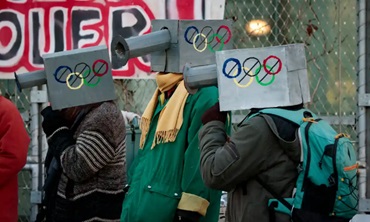The French government is fast-tracking special legislation for the 2024 Paris Olympics that would allow the use of video surveillance assisted by artificial intelligence (AI) systems.
Ministers have argued that certain exceptional security measures are needed to ensure the smooth running of the events that will attract 13 million spectators, but rights groups have warned France is seeking to use the Games as a pretext to extend police surveillance powers, which could then become permanent.
The measures include a proposal to legalise the use of AI-assisted video surveillance.
For the first time in France, this would allow automated video camera surveillance, in which AI algorithms would be used to detect suspicious or “abnormal” activity in crowds. These algorithms would analyse video images from fixed CCTV cameras or drones, highlighting behaviour deemed abnormal or suspicious, which would be automatically signalled to police, who could act.
The AI systems would be used to monitor crowds such as the 600,000 people expected at the Paris opening ceremony but could also be used around stadiums, on city streets and on public transport.
The French sports minister, Amélie Oudéa-Castéra, has described the bill as introducing “essential adjustments” in order for the games to run smoothly. The interior minister, Gérald Darmanin, said the bill would give a French “framework” for security for the games.
The proposal comes as France seeks to avoid a repeat of the chaos of last year’s Champions League final between Liverpool and Real Madrid at the Stade de France, where fans including children were teargassed, and many supporters complained they were mugged around the stadium.
The French government has emphasised that its security proposals for the Olympics do not include the use of facial recognition technologies. Ministers have also said automated video surveillance was an experimental measure for a defined period.
But rights groups said the proposal would cover all sporting, festive and cultural events in a broad time frame, which would run from this spring until June 2025, long after the Games ended. They said there was a danger the measure could then become permanent law.
The bill will be considered by the lower house in the national assembly in February after Senate approval on Tuesday, but campaigners have called for more public debate.
Amnesty International called the proposal a “turning point” in the use of AI surveillance technologies in France and said it marked a “dangerous step” for human rights and privacy rights.
Katia Roux, the advocacy officer on technology and human rights at Amnesty International France, said: “We’re deeply worried by the fact that these algorithms will be able to analyse images from fixed CCTV cameras or drones to detect ‘abnormal or suspect’ behaviour. First, there is the issue of defining abnormal or suspect behaviour – who will decide what behaviour is the norm or not? Also, in terms of human rights and fundamental freedoms, we consider the proposal presents a danger to the right to a private life, it could also impact freedom of expression, freedom to meet, and the principle of non-discrimination.”








